PocketGamer.biz has partnered up with US developer Pixelberry Studios to highlight its candid stories on the trials and triumphs of a startup game studio whose debut title High School Story stayed in the top grossing top 100 chart for a year.
This bi-weekly series of articles will provide a mix of drama, detailed learnings, and actual numbers from their experience launching and supporting a top game.
Pixelberry was founded in 2012 as a small startup.
With three founders and seven full-time employees, our first few meetings were held at our CEO Oliver Miao's house or a nearby public library.
After that, we set up in a temporary space for a few months while our eventual office underwent renovations.
Running lean
From that temporary office space, we moved into our current setup - two small meeting rooms and one main work space, all in under 2,000 square feet.
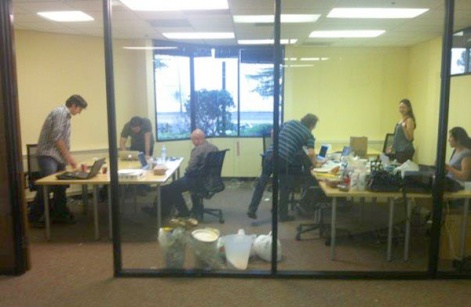
Now, just three years later in 2015, we have over thirty people in that same Mountain View office space, as well as a large contingent of people working from various locations throughout the United States - one of our co-founders is in Boston, an artist lives in Colorado, a developer in Oregon, and so on.
It only takes one look at Pixelberry to realize that this is an old-school, no-frills startup.
It only takes one look at Pixelberry to realize that this is an old-school, no-frills startup.
To this day, the only signage we have announcing our name is the free one that the building managers stenciled on our door.
And our philosophy about scaling up was similar.
How it happened
In part because our company philosophy centers around being very conservative with our spending and in part because we haven't taken on any investors, there was never a moment where we needed to hire rapidly.
We never moved to a bigger office or did any major organizational restructuring.
Instead, we added people one or two at a time, growing the writing team when we needed more writers to keep up the content pipeline, or adding another member to the QA team when we began ramping up on Hollywood U.
It happened one person at a time, over the course of three years - a relatively long time in the life of a startup.
Scaling communication
When we started Pixelberry, it was easy for everyone to know everything that was happening in the company and with our products. It was nearly unavoidable, with people often talking about various issues while standing in the center of the room or even when talking to someone at a desk next to you.
It was common to see people gathered around someone's monitor, looking at the latest art to come in or trying to find solutions to a problem.
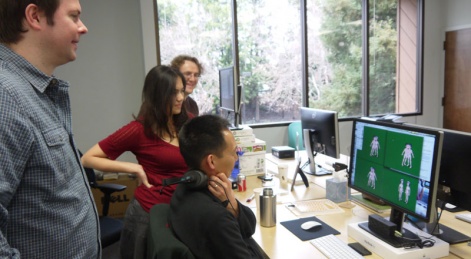
With the office growing more crowded, it isn't as easy to have a casual conversation in the middle of the room without disrupting everyone.
And with so many people working out of the office - and even out of the state - it's even more important to be able to communicate efficiently.
We found that emails were problematic because too often someone would be left off of the thread.
Our current solution is to use Slack.
We still needed to hire more people. Our solution? Smaller desks.
Though we've only been using it for a couple months, it's already become popular with our team because it allows users to drop in on different conversations or simply check in on the progress of a certain topic.
Silicon Valley problems
When started running out of space a year ago, we looked into our options for moving to a bigger office space.
But in Mountain View's highly competitive office space market, we weren't able to find anything that fit what we were looking for.
Yet we still needed to hire more people. Our solution? Smaller desks.
We traded in our luxurious Ikea Linnmon desks, which measured 59 inches wide, for Ikea Bekant desks, which saved an entire foot-per-person by measuring in at only 47.25 inches wide.
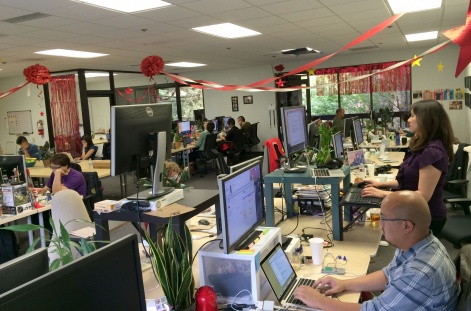
That might not seem like much, but it let us squeeze in an extra four desks - which gave us room for some much-needed new hires: an artist, a designer/UI artist, a producer, and a writer.
What is company culture, anyway?
In the first year of Pixelberry, the company culture was easy to maintain.
Everyone wanted to make our startup a fun, exciting, and positive place to work. People would bring in pies to share with the office.
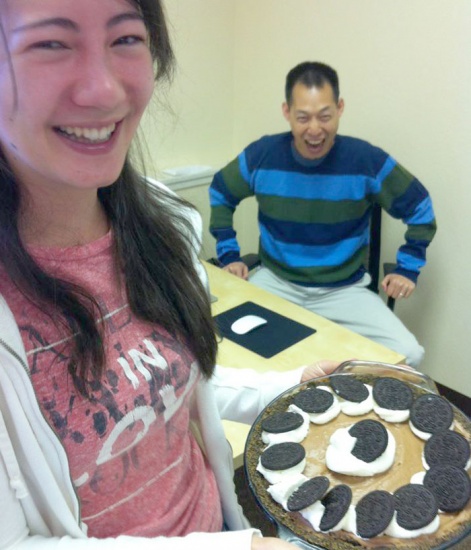
A few times a week, we'd gather around the two desks that had been pushed together to form the 'lunch table' and play card games while we ate.
We'd have game nights that would go past midnight. We never worried about our company culture because there was no need to worry about it.
But once you cram thirty people into a space originally meant for half that number, not only are you adding many new voices and perspectives to the company culture, but you're also asking a lot for them to accept those close quarters with a smile.
So what do we do to keep company culture positive?
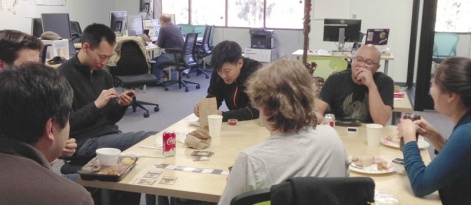
A few perks help - lunches brought in a few days a week, team trips to see teen movies that are popular with our players, and we do still even have game nights that last past midnight, though as team gets busier, those game nights become less frequent.
What we learned along the way
Pixelberry's growth caught me by surprise. Even though I was involved in hiring and the launch of our second game, it still came as a shock when I realized we were no longer the little studio I thought of us as.
Somewhere along the line, we hit the tipping point and went from a small, scrappy startup to something bigger - a thirty person team that supported two live products while also working on new projects.
And it all happened in a space that originally seemed relatively roomy with only ten people, but pretty squished with over thirty, and that's not even factoring in that we have almost as many people working out of the office.
Small tasks that only took a few minutes with a company of 10 can suddenly take hours when you're dealing with 40 people.
What I learned from the experience is that a high-level view is imperative.
In the fast-paced world of mobile gaming, it can be easy to focus on the next milestone, the next update, or the next big feature and forget the bigger picture of what the company looks like and what it feels like both for long-time employees and new hires.
Small tasks that only took a few minutes with a company of 10 can suddenly take hours when you're dealing with 40 people - and if your processes aren't smooth and easy to understand, you'll quickly realize that things need to change.
Overall, it's important to get it right when things are small - that way, if things take off, you'll be ready to scale without having to do any major overhauls.
We got lucky. With understanding employees who don't mind squishing together and evolving practices that we're able to evaluate and re-evaluate as we grow, Pixelberry's growing pains have been, well, a pain, but they could have been much worse!
Kara Loo is the COO of Pixelberry Studios.
Through partnerships with non-profits, Pixelberry's hit game High School Story has taught millions of players about tough teen issues, like cyberbullying and eating disorders.
You can find out more at pixelberrystudios.com





















